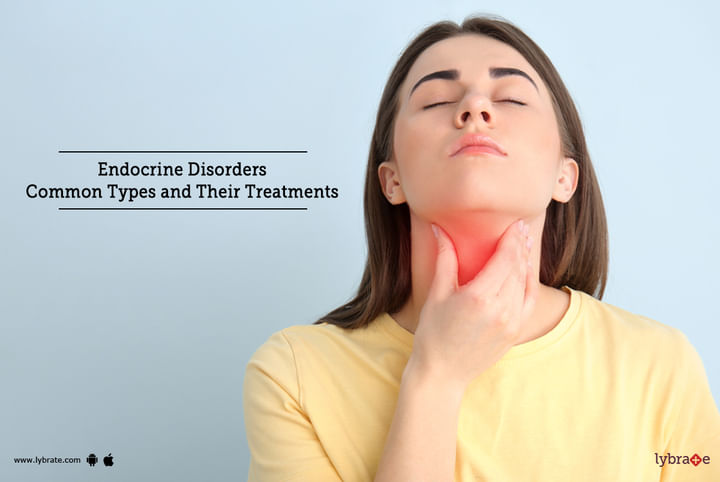Get the App
For Doctors
Login/Sign-up
Last Updated: Sep 13, 2024
BookMark
Report
Endocrine Disorders: Common Types and Their Treatments
What is Endocrine Disorders?
Endocrine disorders are medical conditions that affect the body's endocrine system.
Many symptoms, including exhaustion, weight gain, and changes in mood or appetite, might be brought on by them.
Endocrine disorders may be caused by a number of factors, including genetics, environmental exposure, and other medical conditions.
Types of Endocrine disorder:
- Diabetes Mellitus: It is a chronic disorder that causes the body to be less able to make or react to insulin, which raises blood sugar levels.
- Hypothyroidism: This disorder causes slower biological activities because the thyroid gland does not generate enough of several hormones.
- Hyperthyroidism: A disorder when the thyroid gland overproduces certain hormones, causing the body to operate quickly.
- Cushing's Syndrome: A disorder that can result in weight gain and other symptoms due to excessive amounts of the hormone cortisol, which is generated by the adrenal glands.
- Addison's Disease: It is an autoimmune condition that damages the adrenal glands and causes inadequate cortisol and other hormone synthesis.
- Acromegaly: A disorder caused by excess growth hormone production, resulting in enlarged hands and feet, facial features, and other physical changes.
- Polycystic Ovarian Syndrome (PCOS): A hormone disorder that affects female reproductive health, leading to irregular menstrual cycles and infertility issues
What are the signs and symptoms of Endocrine Disorders?
- Diabetes: The signs and symptoms of this condition include an increase in thirst, frequent urination, exhaustion, loss of weight, blurry vision, and a slowing of wound healing.
- Hypothyroidism: It is characterised by a variety of symptoms, such as an increase in body weight, constipation, weariness, dry skin and hair, and depression.
- Hyperthyroidism: Symptoms include sudden weight loss, nervousness or irritability, rapid heartbeat, sweating profusely and bulging eyes (exophthalmos).
- Cushing’s Syndrome: This disorder is caused by an overproduction of cortisol from the adrenal glands which can lead to a variety of signs or symptoms such as weight gain in the face and trunk area as well as thinning arms and legs; thinning skin; pink or purple stretch marks on abdomen; high blood pressure; muscle weakness; fatigue; and increased risk for infections due to impaired immune system function.
- Addison’s Disease: This endocrine disorder occurs when the adrenal glands don't produce enough hormones such as cortisol and aldosterone leading to symptoms like fatigue, muscle weakness, loss of appetite, nausea/vomiting, low blood pressure (hypotension), darkening of skin in certain areas (hyperpigmentation), salt cravings along with depression and anxiety.
What are possible complications of Endocrine Disorders?
- Diabetes can lead to a variety of complications, such as heart disease and stroke, kidney damage, vision loss, nerve damage, and amputation.
- Hypothyroidism can cause a variety of physical and mental symptoms, such as fatigue, depression, dry skin and hair loss. It can also lead to an increased risk of heart disease and high cholesterol.
- Hyperthyroidism can cause a wide range of symptoms including weight loss, increased appetite, increased sweating, palpitations (a feeling like your heart is racing), difficulty sleeping and irritability. It can also lead to an increased risk of osteoporosis.
- Cushing's Syndrome symptoms include weight gain in the face and upper body region, thinning skin, stretch marks on the skin, acne and other skin problems, excessive facial hair growth in women and weakened muscles or bones.
- Addison's Disease is caused by an underproduction of hormones from the adrenal gland leading to fatigue, low blood pressure (hypotension), salt craving and darkening patches on the skin (hyperpigmentation).
- Other endocrine disorders such as polycystic ovary syndrome (PCOS) or adrenal insufficiency can also lead to various complications including infertility or an increased risk for diabetes or cardiovascular disease.
Benefits of Natural Treatments
- Non-invasive, safe and low-risk: Natural treatments are generally non-invasive, safe and low-risk. This can lead to greater acceptance by patients as well as lower healthcare costs.
- Empowerment: Natural treatments can help patients feel more in control of their health by taking an active role in their own healing process.
- Improved quality of life: Natural treatments are known to improve overall quality of life, reduce fatigue and stress levels, and improve mood and energy levels.
Holistic Ways to Manage Symptoms
- Eat a nutrient-dense diet: focus on fresh, whole, and unprocessed foods.
- Exercise regularly: aim for at least 30 minutes of moderate exercise per day.
- Reduce stress: practice relaxation techniques such as yoga, meditation, and deep breathing.
- Get adequate sleep: aim for 7-8 hours per night.
- Supplement carefully: nutritional supplements may help to manage endocrine disease symptoms when used correctly.
- Avoid toxins: limit your exposure to environmental pollutants and toxic chemicals in processed foods and personal care products.
Diet and Exercise Changes for treating Endocrine Diseases
For endocrine diseases, diet and exercise changes may include reducing the amount of processed foods consumed, increasing intake of fruits and vegetables, reducing caffeine and alcohol intake, exercising regularly, and monitoring blood sugar levels.
Mindfulness Practices for endocrine disease
- Deep Breathing: The practice of taking long, calm breaths while concentrating on the breath might be beneficial for lowering stress and restoring hormone balance.
- Body Scanning: Scanning your body and noticing any sensations or emotions can help to bring awareness to areas of tension that may be contributing to endocrine disease.
- Guided Imagery: Guided imagery can help create a relaxed state, reduce stress levels, and promote healing.
- Meditation: Meditation can help to reduce stress and balance hormones that are out of balance due to endocrine disease.
- Gratitude Practice: Practising gratitude can help shift focus away from worries and negative thoughts, allowing for a more positive outlook on life which can in turn help improve endocrine health.
Home remedies and tips for Endocrine Disorders
- Ashwagandha (Withania somnifera): Ashwagandha is an Ayurvedic herb used for centuries to help balance hormones, reduce inflammation and stress, improve circulation, and support a healthy immune system.
- Fenugreek (Trigonella foenum-graecum): Fenugreek is an Ayurvedic herb that helps to regulate the endocrine system and its hormones. It has been shown to help lower cortisol levels, regulate blood sugar levels and promote a healthy metabolism.
- Shatavari (Asparagus racemosus): Shatavari has been traditionally used in Ayurveda to balance hormones, boost fertility and increase libido. It can also help reduce anxiety and stress levels that can affect hormone balance.
- Guggul (Commiphora mukul): Guggul is a resin derived from the mukul tree that has been used in Ayurveda for centuries to treat endocrine disorders such as diabetes, thyroid problems, low libido and obesity.
- Brahmi (Bacopa monnieri): Brahmi is an Ayurvedic herb that helps to reduce stress and anxiety which can lead to better hormonal balance in the body.
- Amalaki (Emblica officinalis): Amalaki is an ancient Ayurvedic herb used to boost energy levels and balance hormones naturally by stimulating the pituitary gland located at the base of the brain responsible for releasing important hormones in the body like serotonin, dopamine and melatonin which are linked to overall well being..
- Licorice root (Glycyrrhiza glabra): Licorice root is an adaptogenic herb with many health benefits including balancing hormones naturally by increasing progesterone levels while decreasing cortisol production in the body which can be beneficial for those with endocrine disorders like PCOS or infertility..
- Bitter melon (Momordica charantia): Bitter melon has long been used in traditional medicine as a natural remedy for diabetes due to its ability to lower blood sugar levels while also helping with other endocrine disorders like hypothyroidism due to its high content of antioxidants, vitamins, minerals and other nutrients..
- Shilajit (Asphaltum punjabinum): Shilajit is a mineral-rich resin found in mountain ranges across India that has been used for centuries as an Ayurvedic tonic for treating endocrine disorders like diabetes due its high content of trace minerals including calcium, magnesium, iron and zinc as well as plant based compounds like fulvic acid which help regulate hormones naturally..
What are the surgical treatments for Endocrine Disorders?
- Endoscopic Thyroidectomy: The thyroid gland may be completely or partially removed with this operation, which involves just a little amount of incision work.The procedure is used to treat various thyroid disorders such as hyperthyroidism, nodules, goitres, and cancer of the thyroid gland.
- Adrenalectomy: During this procedure, the adrenal glands, which are important for manufacturing hormones that govern metabolism and other physiological processes, may have all or a portion of their tissue removed. It is used to treat conditions such as Cushing's syndrome, congenital adrenal hyperplasia (CAH), aldosteronism, and pheochromocytoma.
- Parathyroidectomy: This procedure involves removing one or more of the parathyroid glands located in the neck near the thyroid gland. It is used to treat conditions such as hyperparathyroidism, which can lead to high levels of calcium in the blood and increased risk for kidney stones and bone loss.
- Pancreatectomy: This procedure involves removing some or all of the pancreas, an organ located behind the stomach that helps with digestion and produces hormones to regulate blood sugar levels. It can be used to treat pancreatic cancer, pancreatitis, and other conditions affecting the pancreas.
Best doctors to consult for Endocrine Disorders?
- Endocrinologists: Endocrinologists specialise in the diagnosis and treatment of endocrine disorders, such as diabetes, thyroid disease, and reproductive disorders. They are able to provide comprehensive care for endocrine-related conditions, from diagnosis to treatment.
- Primary Care Physicians: Primary care physicians are general practitioners who can provide basic care for endocrine disorders. They may be able to diagnose and treat simple conditions or refer patients to an endocrinologist when needed.
- Paediatricians: Paediatricians specialising in the health and medical care of infants, children, and adolescents. They can diagnose and treat endocrine disorders that affect children and provide ongoing care for these conditions as they age.
- Nurse Practitioners: Nurse practitioners (NPs) are advanced practice nurses who can provide primary care services including diagnosis, treatment, and management of endocrine disorders in both adults and children.
In case you have a concern or query you can always consult a specialist & get answers to your questions!



+1.svg)
